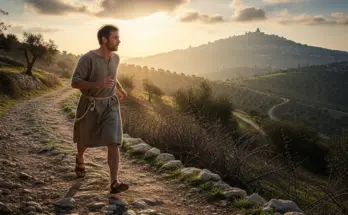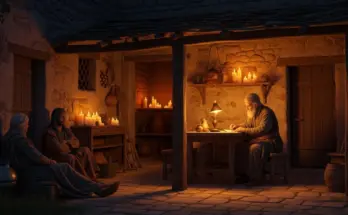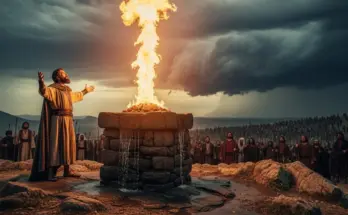When we study Daniel 3, we meet three young Hebrews whose faith shines in a dark world. Their story encourages us today because they faced pressure to compromise, yet they remained faithful to God. Many believers feel the weight of cultural pressure, and Daniel 3 helps us see how God stands with His people in hard moments. The account shows us that loyalty to God is always worth the cost, because He honors those who trust Him.
Ready to grow in God’s Word? Grab Tim LaHaye’s classic guide and start your journey today!
Daniel 3 begins with a familiar problem, because pride often leads people to demand what only God deserves. King Nebuchadnezzar built a large golden image and forced everyone to bow before it. The king believed his power could decide the devotion of his people. That misunderstanding still appears today. Human authority cannot require the worship of the heart. Worship belongs to God alone.
As we walk through Daniel 3, we see faith in action. We also see how God responds when His people face danger because they refuse to compromise. This chapter shows us that God does not promise an easy path, but He does promise His presence. So, when fear rises or pressure builds, we can remember Daniel 3 and rest in God’s faithfulness. The same God who stood with those three young men stands with us today.
Nebuchadnezzar’s Golden Image (Daniel 3:1–7)
1 King Nebuchadnezzar made an image of gold, whose height was sixty cubits and its breadth six cubits. He set it up on the plain of Dura, in the province of Babylon. 2 Then King Nebuchadnezzar sent to gather the satraps, the prefects, and the governors, the counselors, the treasurers, the justices, the magistrates, and all the officials of the provinces to come to the dedication of the image that King Nebuchadnezzar had set up. 3 Then the satraps, the prefects, and the governors, the counselors, the treasurers, the justices, the magistrates, and all the officials of the provinces gathered for the dedication of the image that King Nebuchadnezzar had set up. And they stood before the image that Nebuchadnezzar had set up. 4 And the herald proclaimed aloud, “You are commanded, O peoples, nations, and languages, 5 that when you hear the sound of the horn, pipe, lyre, trigon, harp, bagpipe, and every kind of music, you are to fall down and worship the golden image that King Nebuchadnezzar has set up. 6 And whoever does not fall down and worship shall immediately be cast into a burning fiery furnace.” 7 Therefore, as soon as all the peoples heard the sound of the horn, pipe, lyre, trigon, harp, bagpipe, and every kind of music, all the peoples, nations, and languages fell down and worshiped the golden image that King Nebuchadnezzar had set up.
The chapter opens with King Nebuchadnezzar setting up a golden image on the plain of Dura. The statue stood high above the people and reflected the king’s pride. Nebuchadnezzar wanted full loyalty from the officials in his kingdom. He gathered them to honor the image and demanded that all people bow when they heard the music. The pressure was intense because refusal meant death in a blazing furnace. Many people bowed without question, because fear often controls hearts more than conviction. The scene reminds us that earthly kingdoms often misuse power. When worship becomes a political tool, corruption follows. The king’s command created a moment of decision for everyone present. Daniel 3 makes this clear, because true worship cannot be forced. God calls His people to serve Him in truth. The king’s demand set the stage for the courage of three faithful men. Their refusal would show the difference between fear-based obedience and real devotion. Daniel 3 prepares us to see how faith stands firm when the world demands compromise.
Accusation and Furious Threats (Daniel 3:8–12)
8 Therefore at that time certain Chaldeans came forward and maliciously accused the Jews. 9 They declared to King Nebuchadnezzar, “O king, live forever! 10 You, O king, have made a decree, that every man who hears the sound of the horn, pipe, lyre, trigon, harp, bagpipe, and every kind of music, shall fall down and worship the golden image. 11 And whoever does not fall down and worship shall be cast into a burning fiery furnace. 12 There are certain Jews whom you have appointed over the affairs of the province of Babylon: Shadrach, Meshach, and Abednego. These men, O king, pay no attention to you; they do not serve your gods or worship the golden image that you have set up.”
Some Chaldean officials saw the three Hebrews standing tall when others bowed. They used the moment to accuse them before the king. Jealousy often fuels false accusations, and these officials saw a chance to remove the young men from places of influence. They reminded the king of his decree and highlighted the Hebrews’ refusal. This angered the king because he expected complete control. Daniel 3 reveals how faith can stir opposition even when we live with integrity. The officials described the young men as disrespectful toward the king, though they had served faithfully in the past. Their only crime was obedience to God. The king’s pride increased his rage. He wanted everyone to obey his command without question. Daniel 3 shows that pressure rises when we choose God’s way over popular expectations. The accusations created a direct conflict between loyalty to God and loyalty to human authority. The three Hebrews faced real danger because they held to the truth. Their courage reminds us that devotion to God often meets resistance, but God stays close to His people.
The Test of Loyalty (Daniel 3:13–18)
13 Then Nebuchadnezzar in furious rage commanded that Shadrach, Meshach, and Abednego be brought. So they brought these men before the king. 14 Nebuchadnezzar answered and said to them, “Is it true, O Shadrach, Meshach, and Abednego, that you do not serve my gods or worship the golden image that I have set up? 15 Now if you are ready when you hear the sound of the horn, pipe, lyre, trigon, harp, bagpipe, and every kind of music, to fall down and worship the image that I have made, well and good. But if you do not worship, you shall immediately be cast into a burning fiery furnace. And who is the god who will deliver you out of my hands?” 16 Shadrach, Meshach, and Abednego answered and said to the king, “O Nebuchadnezzar, we have no need to answer you in this matter. 17 If this be so, our God whom we serve is able to deliver us from the burning fiery furnace, and he will deliver us out of your hand, O king. 18 But if not, be it known to you, O king, that we will not serve your gods or worship the golden image that you have set up.”
The king called the three Hebrews into his presence. His anger was fierce, yet he offered them a second chance. He asked them if the accusations were true and reminded them of the consequences. The furnace waited for anyone who refused. Nebuchadnezzar tried to intimidate them because he believed no god could rescue them from his hand. Daniel 3 shows his pride and his misunderstanding of God’s power. The three young men answered with calm faith. They told the king that God was able to save them. They also said they would never bow even if God chose not to deliver them. Their faith was steady because it rested on God, not on results. Daniel 3 teaches us that obedience does not depend on outcomes. True faith trusts God’s character. The young men respected the king, yet they placed God above human authority. Their response remains one of the strongest statements of faith in Scripture. They believed God could save them, but they also believed He was worthy even if He allowed suffering.
Into the Fiery Furnace (Daniel 3:19–23)
19 Then Nebuchadnezzar was filled with fury, and the expression of his face was changed against Shadrach, Meshach, and Abednego. He ordered the furnace heated seven times more than it was usually heated. 20 And he ordered some of the mighty men of his army to bind Shadrach, Meshach, and Abednego, and to cast them into the burning fiery furnace. 21 Then these men were bound in their cloaks, their tunics, their hats, and their other garments, and they were thrown into the burning fiery furnace. 22 Because the king’s order was urgent and the furnace overheated, the flame of the fire killed those men who took up Shadrach, Meshach, and Abednego. 23 And these three men, Shadrach, Meshach, and Abednego, fell bound into the burning fiery furnace.
Nebuchadnezzar’s rage reached its height when he heard their answer. He ordered the furnace heated seven times hotter than normal. His strongest soldiers tied the young men and threw them into the fire. The fire was so intense that it killed the soldiers who carried out the order. Daniel 3 shows how human anger leads to reckless actions. The furnace represented the king’s attempt to maintain control, but the scene shows how powerless he was against God’s plan. The young men fell into the fire bound, and their situation looked hopeless. The world often sees faith as weakness, yet God sees faith as the place where His power shines. Daniel 3 helps new believers understand that trials do not mean God has forgotten us. Instead, He allows us to see His strength when ours fails. The furnace looked like the end, but God was already at work. This moment prepares us for one of the most powerful displays of God’s presence in the Old Testament.
A Fourth Man in the Fire (Daniel 3:24–27)
24 Then King Nebuchadnezzar was astonished and rose up in haste. He declared to his counselors, “Did we not cast three men bound into the fire? ” They answered and said to the king, “True, O king.” 25 He answered and said, “But I see four men unbound, walking in the midst of the fire, and they are not hurt; and the appearance of the fourth is like a son of the gods.” 26 Then Nebuchadnezzar came near to the door of the burning fiery furnace; he declared, “Shadrach, Meshach, and Abednego, servants of the Most High God, come out, and come here!” Then Shadrach, Meshach, and Abednego came out from the fire. 27 And the satraps, the prefects, the governors, and the king’s counselors gathered together and saw that the fire had not had any power over the bodies of those men. The hair of their heads was not singed, their cloaks were not harmed, and no smell of fire had come upon them.
Nebuchadnezzar looked into the furnace and saw something impossible. He saw four men walking freely in the fire. The fourth looked like a divine messenger. God had joined the young men in the flames. Daniel 3 shows God’s presence in our hardest moments. Nebuchadnezzar called the men to come out, and they walked out without burns, smoke, or harm. Their clothes were untouched. This miracle revealed God’s authority over nature and human power. The king realized that their God was greater than any earthly ruler. Daniel 3 teaches us that God’s presence is stronger than persecution. The three Hebrews did not face the fire alone. Their rescue showed all the people that faith rests in a living God. New believers find comfort here because trials can feel overwhelming. Yet God stays near when we suffer for His name. The king’s amazement shows how God uses faithful people to reveal His glory in dark places.
Nebuchadnezzar’s Praise and Promotion (Daniel 3:28–30)
28 Nebuchadnezzar answered and said, “Blessed be the God of Shadrach, Meshach, and Abednego, who has sent his angel and delivered his servants, who trusted in him, and set aside the king’s command, and yielded up their bodies rather than serve and worship any god except their own God. 29 Therefore I make a decree: Any people, nation, or language that speaks anything against the God of Shadrach, Meshach, and Abednego shall be torn limb from limb, and their houses laid in ruins, for there is no other god who is able to rescue in this way.” 30 Then the king promoted Shadrach, Meshach, and Abednego in the province of Babylon.
The king praised the God of Shadrach, Meshach, and Abednego. He recognized that they trusted God and gave up their lives rather than worship any other. Daniel 3 ends with the king acknowledging God’s greatness. He made a new decree that protected the worship of the true God. The three Hebrews were promoted in the province of Babylon. Their faith brought honor to God and blessing to their lives. Daniel 3 shows how steadfast devotion can influence even the hardest hearts. The king did not become a believer at this point, but he respected God’s power. This chapter helps us see that obedience has a ripple effect. When we remain faithful, people notice. God can use our trials to open doors for His truth. Daniel 3 closes with hope because the same God who saved those men works in our lives today.
Closing Thoughts on Daniel 3
Daniel 3 gives us a clear picture of faith under pressure. The three young Hebrews faced a king, a crowd, and a furnace, yet they stood firm. Their story encourages us because we face trials today that test our loyalty to God. We might not stand before a golden image, but we face cultural pressures that push us to compromise. Daniel 3 reminds us that God honors those who remain faithful.
We learn that faith does not remove trials. The young men still entered the furnace, but God met them there. Many believers discover God’s nearness in their hardest moments. Daniel 3 helps us see that God stays close when we choose obedience. His presence in the fire shows His love for His people.
At the end of the chapter, the king praised God. He saw faith in action and witnessed God’s saving power. Our faith can make a difference in the world as well. Daniel 3 calls us to trust God with courage and hope. The same God who delivered those three young men stands with us today. When we hold to Him, He gives strength, wisdom, and peace.




